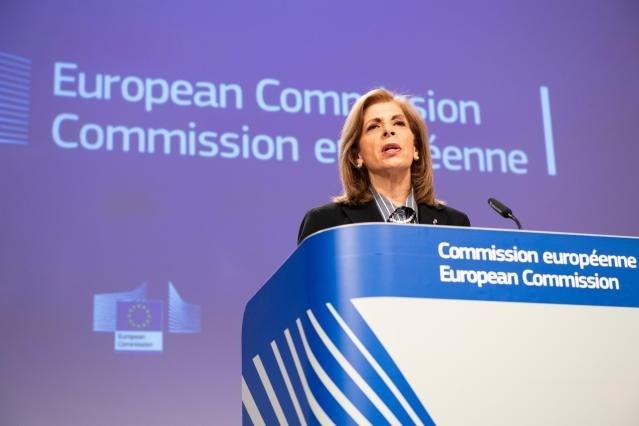The European Commission adopted on Tuesday a new plan for a united EU front to step up the fight against the pandemic aiming at vaccination 70 % of the adult population by summer 2021.
Ahead of Thursday’s meeting of European leaders on a coordinated response to the COVID-19 crisis, the Commission sets out a number of actions needed to step up the fight against the pandemic.
In a Communication, it calls on Member States to accelerate the roll-out of vaccination across the EU: by March 2021, at least 80% of people over the age of 80, and 80% of health and social care professionals in every Member State should be vaccinated. And by summer 2021, Member States should have vaccinated a minimum of 70% of the adult population.
The Commission also calls on Member States to continue to apply physical distancing, limit social contacts, fight disinformation, coordinate travel restrictions, ramp up testing, and increase contact tracing and genome sequencing to face up to the risk from new variants of the virus.
In a press conference (19 January), Vice-President Margaritis Schinas said that he was confident that there would be sufficient vaccine doses from the several vaccine producers with whom the Commission has signed contracts in a joint procurement on behalf of all member states. Without specifying the current bottlenecks in the member states, he was also confident that vaccinations could be speeded up.
“The emergence of new variants of the virus and substantial rises in cases leave us no room for complacency,” he said. “Now more than ever must come a renewed determination for Europe to act together with unity, coordination and vigilance. Our proposals today aim to protect more lives and livelihoods later and relieve the burden on already stretched health care systems and workers.”
“This is how the EU will come out of the crisis. The end of the pandemic is in sight though not yet in reach.” While admitting that it was a race against time, he did not specify when exactly by summer the vaccination goal should be achieved. Setting quantitative goals would accelerate the national vaccination programmes, he added.
Another issue is whether vaccinating only 70 % of the adult population will be enough to generate group immunity and stop the spread of the virus.
Stella Kyriakides, Commissioner for Health and Food Safety, admitted that, “Vaccinations will still take time until they reach all Europeans and until then we must take immediate, coordinated and proactive steps together. Working together with unity, solidary and determination, we can soon start to see the beginning of the end of the pandemic.”
On the issue of transparency and liability in the contracts with the vaccine developers, she said that the Commission wanted as much transparency as possible but was bound by confidentiality clauses in the contracts. She assured that liability is an important part of the legal framework and a red line which the Commission never crossed. “We wanted citizens’ rights to be fully protected.”
A Commission spokesperson clarified that the rule is that companies are liable but that in very specific cases member states may indemnify the company.
The Commission opposes blanket and uncoordinated travel restrictions imposed by the member states but discourages strongly non-essential travel until the epidemiological situation has considerably improved. Proportionate travel restrictions, including testing of travellers, should be maintained for those travelling from areas with a higher incidence of variants of concern.
The Commission is also working with member states on mutually recognized vaccination certificates, in full compliance with EU data protection law. The certificates in this form would only include medical information and not confer any specific benefits. The issue will be discussed at the Council meeting on Thursday.
The Greek Prime-Minister has recently proposed a form of vaccination “passports” for those who have been vaccinated. Such passports could allow people to travel without restriction to other countries and enjoy services in their home countries that would be banned for non-vaccinated persons. In this way, the passports would serve as an incentive for people to get vaccinated.
However, the Commission seems reluctant to the proposal as long as only a minority of people have been vaccinated.
The Commissioners also outlined actions for international solidarity and assured that EU’s vaccines strategy was not only about providing vaccines to the EU member states but also to the candidate countries, EU’s neighbours and partners, and low-income countries in the whole world. If EU has this ambition, it needs to step up its efforts.
WHO Director-General Dr Tedros Adhanom Ghebreyesus warned in a speech on Monday that, “We now face the real danger that even as vaccines bring hope to some, they become another brick in the wall of inequality between the world’s haves and have-nots. I need to be blunt: the world is on the brink of a catastrophic moral failure – and the price of this failure will be paid with lives and livelihoods in the world’s poorest countries.”
M. Apelblat
The Brussels Times

